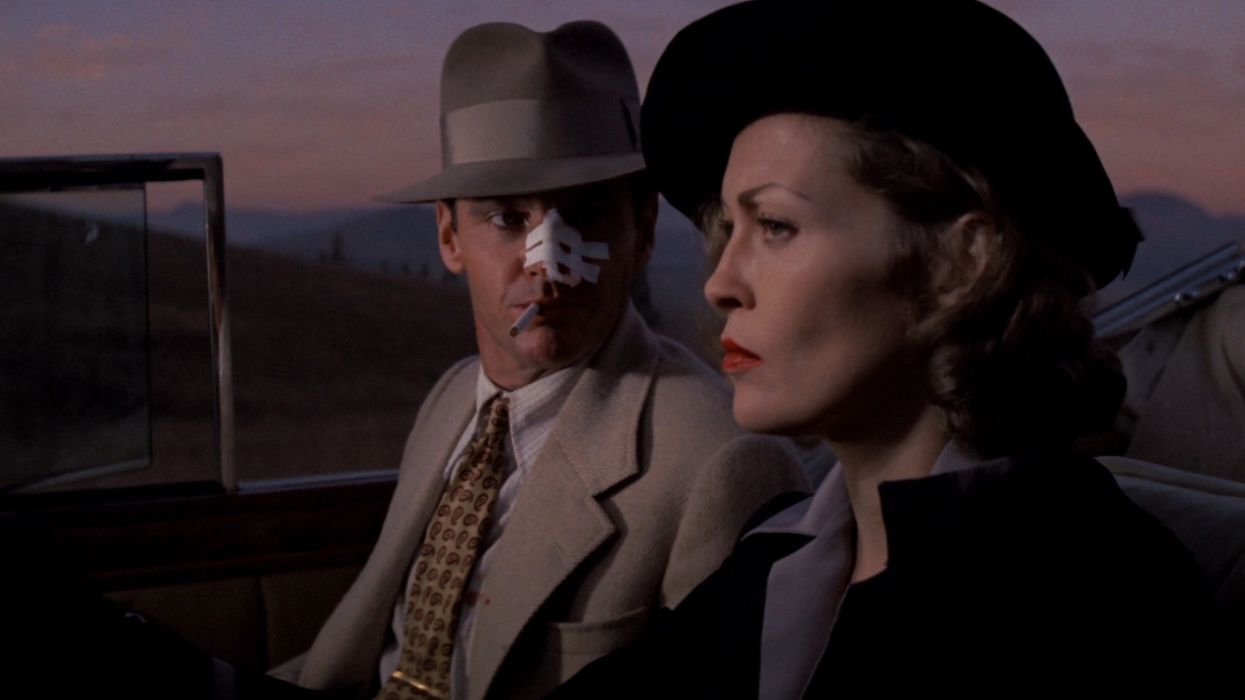Watch: Why 'Chinatown' is Considered One of the Greatest Screenplays of All Time
This video looks at the screenplay for 1974's 'Chinatown,' examining why it's often cited as one of the greatest scripts ever written.

Ever since there have been books on screenwriting (the modern age can probably be said to date from Syd Field's Screenplay, first published in 1979), Robert Towne's screenplay for Chinatown has been cited as one of the greatest screenplays ever written.
In the video below from Jack's Movie Reviews, Jack looks at the structural elements of the Chinatown script to find out why it stands out from so many others and is even today held up as an example of perfection via its screenwriting form.
No Easy Answers
According to Jack, part of the reason the screenplay is successful is that while the narrative hits the normal beats, it also twists them enough to keep the audience guessing. As he says, "the movie is real mystery. There are no easy answers to anything; as the story unfolds, one question is answered, only for that answer to reveal two more questions." However, the answers to all of these questions are contained within the film's first act, which is also a hallmark of great drama.
The real mystery of the film isn't the answer to the mystery that Jake has ostensibly been trying to solve, but in trying to figure out what question has been being asked.
Red Herrings
Much of the film is spent incorporating red herrings, and "one of the most obvious examples…[is] the motif of the water. For the majority of the film, the primary focus appears to be Jake uncovering the water scandal."
While there are, of course, other things at play, the mystery seems to be predicated on the water; ironically, the water is important in that will take us on a journey through Chinatown and in doing so "lead us to a much greater and darker mystery. In fact, by the end of the film, the water seems rather small compared to the momentous consequences that we see in the final scene."
“There are countless times in which we could've guessed something and made an assumption based on pre-existing cinema, but in almost all cases we would have been wrong."
Subverting Expectations
The movie also subverts many of the conventions of the film noir genre, for instance in the characterization of Evelyn Mulwray. In most film noirs, the lead female character is presented as a sort of black widow who will inevitably turn into an antagonist. In the case of Chinatown, however, she is the film's heroine.
Towne uses what we know of the film noir genre, as well as what Jake thinks he knows, only to turn it on its head. “There are countless times in which we could've guessed something and made an assumption based on pre-existing cinema; in almost all cases, we would have been wrong.” While Evelyn is clearly involved in the scandal and "hiding something important," Jake's assumption "ends up costing him in the end" when it is revealed that Evelyn is a victim of a traumatic past.
Throughout the film, we have seen Jake go from a loner who tries to do his job well (staying away from human connection) to someone who attempts to take a more protective role of Evelyn. By the end of the film when he is exposed to the real world and violence in the dark nature of life, "any change he thought had happened disappears…he loses on the literal level, with the antagonist succeeding and the good people losing, but he also loses on an emotional level."
Jack posits that this is a direct response to the film noirs of the 1940s and 50s, where characters might lose on one level while often learning an important lesson in the process. In Chinatown, there is no deeper lesson to be learned, other than that evil triumphs.
One of the greatest strengths of this screenplay is that it never wastes a moment. As Jack says, "every scene, every interaction, and every line of dialogue Is going to serve multiple purposes. Almost every event helps to move the plot forward, and every interaction also serves a second purpose."
There are countless reasons why Chinatown is considered one of the greatest screenplays ever written, but this video is a great primer on what makes it such a model for screenwriters more than forty years after its release.
Source: Jack's Movie Reviews
















